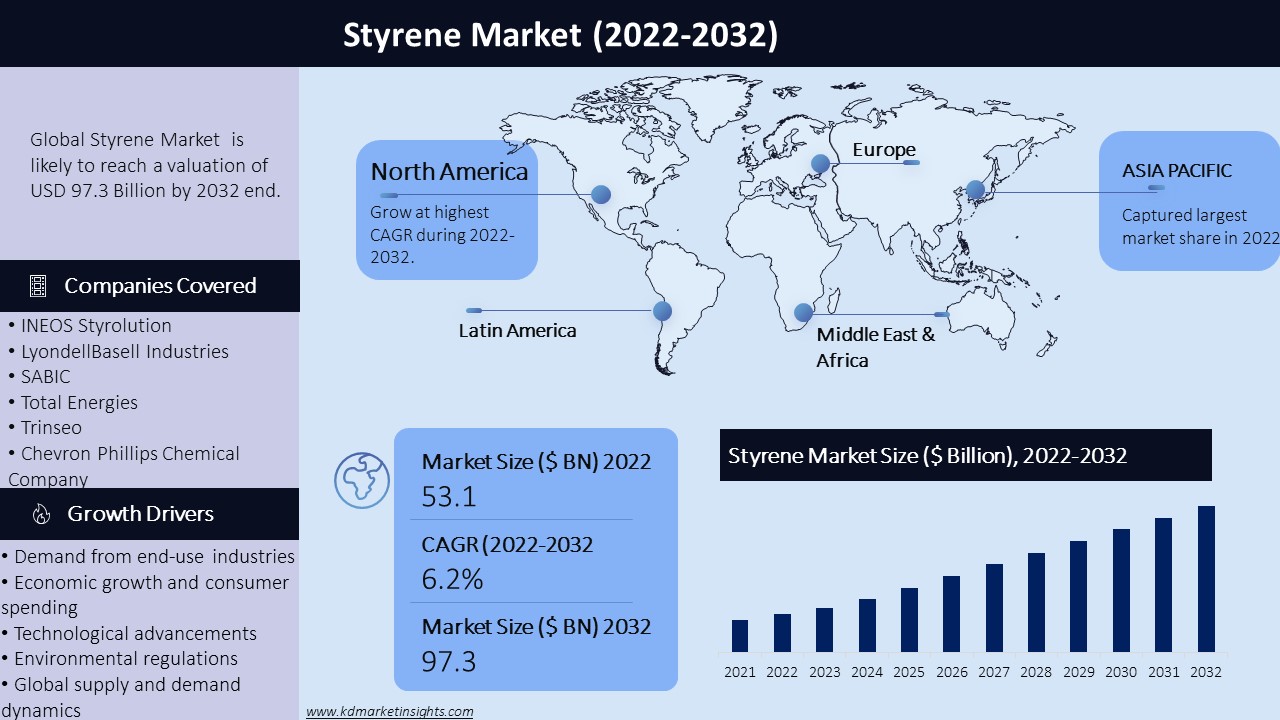Styrene Market : Global Size, Share, Trends, Growth and Forecast, 2022-2032
Styrene Market Definition and Overview
Styrene is an important chemical compound used in the production of various materials and products. It is primarily used in the manufacturing of polymers and resins, particularly polystyrene, which is a widely used plastic. Styrene is also used in the production of synthetic rubbers, latex paints, coatings, adhesives, and packaging materials.
Similar industrial demand, economic condition conditions, and environmental regulations all influence the market for styrene. Styrene consumption is closely related to the general growth of industries including automotive, construction, electronics, and packaging.
The global styrene market size was estimated at USD 53.12 billion in 2022 and is expected to be worth around USD 97.31 billion by 2032, poised to grow at a CAGR of 6.24% during the forecast period 2023 to 2032. The Asia-Pacific is predicted to dominate the styrene market.
|
Styrene Market: Report Scope |
|
|
Base Year Market Size |
2022 |
|
Forecast Year Market Size |
2023-2032 |
|
CAGR Value |
6.24% |
|
Segmentation |
|
|
Challenges |
|
|
Growth Drivers |
|
Styrene Market Driving Factors
The styrene market is driven by the following factors:
Demand from end-use industries: Styrene is in demand because industries like automotive, construction, electronics, and packaging require styrene-based materials in their manufacturing processes.
Economic growth and consumer spending: Styrene-based items, including consumer electronics, automobiles, and packaging materials, are in high demand due to rising strong economic growth and increased consumer spending.
Technological advancements: New styrene-based products and operations are developed as a result of technological and manufacturing advancements, increasing demand and extending the market.
Environmental regulations: Styrene market is impacted by environmental regulations and sustainability initiatives that promoting the use of eco-friendly materials and driving innovations in manufacturing process to reduce emission and environmental impact.
Global supply and demand dynamics: The prices and overall market conditions for styrene are influenced by the dynamics of global supply and demand, which includes elements like product capabilities, raw material vacuity, and trade programmes.
Styrene Market Challenges
The styrene market faces several challenges:
Environmental concerns: Products made with styrene and their disposal may have a negative environmental impact. The industry faces a challenge from the regulatory push to reduce emission and find more sustainable alternatives.
Volatility in raw material prices: Styrene is derived from petroleum feedstocks, and changes in the price of crude oil can have an impact on the cost of the final product, which can affect profitability and market stability.
Competition from alternative materials: Essential accessories like bio-based polymers and substitute like polypropylene, which give similar properties and environmental benefits, compete with styrene.
Health and safety risks: Styrene is considered a dangerous substance, and employees who are exposed to it at high levels may have health risks. For styrene makers, ensuring appropriate safety precautions and legal compliance is a challenge.
Trade restrictions and geopolitical factors: Geopolitical pressures, tariffs, and international trade disputes can all disturb the global supply chain and have an impact on the availability and cost of styrene in many regions.

Styrene Market Regional Synopsis
The regional synopsis of the styrene market is as follows:
North America: The market for North American styrene is distinguished by the presence of established end-use industry, comparable to that seen in the automobile, construction, and packaging industries. Economical growth, technology advancements, and environmental regulations meant to reduce emission and promoting sustainability tell the story of the market.
Europe: Manufacturing and the automotive industries, which are centred in countries like Germany, France, and the United Kingdom, are what are driving the need for styrene in Europe. The dynamics of market in Europe are greatly influenced by environmental regulations and the sustainability initiatives.
Asia Pacific: Due to the rapid industrialization and manufacturing sectors in nations like China, India, and South Korea, the Asia-Pacific region leads the global market for styrene. Styrene demand in the area is high due to factors like urbanisation, population growth, and rising disposable income.
Latin America: Urbanisation, industrial growth, and rising consumer demand all contribute to the Latin American styrene demand. The demand for styrene-based products is primarily driven by the automotive, construction, and packaging industries, with substantial presence in nations like Brazil, Mexico, and Argentina.
The Middle East and Africa: The demand for styrene has seen a moderate increase throughout the Middle East and Africa. The market is increasing in this area due to industrial development, construction activities, and the need for packaging accessories. However, the dynamics of the market might be impacted by fluctuations in oil prices can impact the market dynamics.
Styrene Market Segmentation
The styrene market can be segmented based on various factors:
By Application:
- polystyrene production
- synthetic rubber
- latex paints
- coatings
- adhesives
- packaging materials.
By End-Use Industry:
- automotive
- construction
- electronics
- packaging
By Geography:
- regional demand
- production capacities
- market dynamics
By Product Type:
- Polystyrene
- expanded polystyrene (EPS)
- acrylonitrile butadiene styrene (ABS)
- styrene-butadiene rubber (SBR)
Styrene Market Key Players
Several key players profiled in the report include:
- INEOS Styrolution
- LyondellBasell Industries
- SABIC
- Total Energies
- Trinseo
- Chevron Phillips Chemical Company
- Versalis S.p.A.

Need Customized Report for Your Business ?
Utilize the Power of Customized Research Aligned with Your Business Goals
Request for Customized Report- Quick Contact -
- ISO Certified Logo -

















